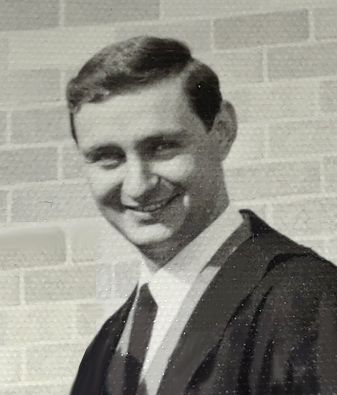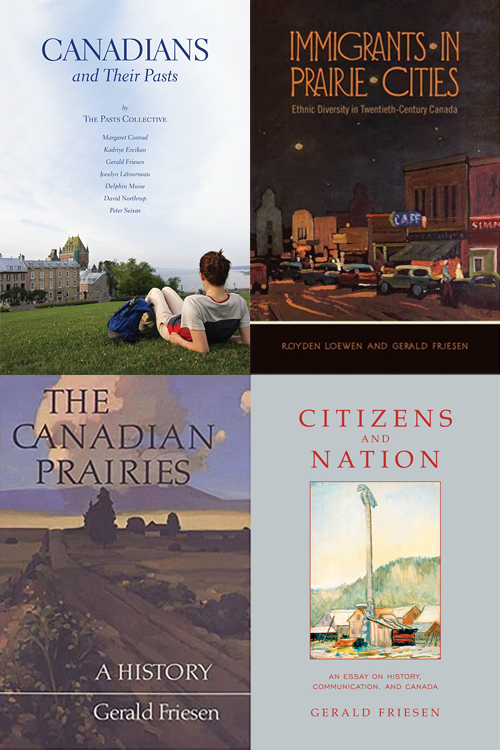As Gerald Friesen sees it, history’s central purpose is to provide perspective.
“In reading history, we make sense of the world,” explains Friesen, who earned his master of arts and his PhD, both in history, from U of T. “During difficult moments for the country — or for the world — it can often feel as though the values we are defending are mere abstractions. Revisiting and considering our history shows us how these principles — democracy, fairness, equality, for example — were pursued in the past and have meaning for us today.”
Throughout his illustrious career, Friesen, a professor emeritus at the University of Manitoba, found perspective through studying the history of the Prairies and the role of communications technologies in shaping Canadian society.

Photo credit: Courtesy of Gerald Friesen.
As a result, he has played a significant role in framing the country’s understanding of Western Canada. In recognition of his contributions to Canadian history, Friesen was recently appointed to the Order of Canada as a member.
As he looks back on his career, Friesen credits U of T for helping him find direction.
“I grew up in Saskatchewan and I've made a career in Manitoba for the last 50 years. In retrospect, my time in Toronto was relatively brief, but in terms of understanding Canada and Canadian history, it was an absolutely formative period of my life,” he explains.
In many ways, Friesen was at the right place at the right time to start an academic career in history.
After earning his bachelor of arts in history from the University of Saskatchewan, Friesen headed to U of T in 1965 for graduate studies
There, he found a natural community. He became friends with fellow classmates Michael Bliss and Paul Rutherford (who would both become professors in the Department of History at U of T). He met and studied alongside many interesting students from across Canada and beyond; with the spike in young people pursuing post-secondary education in the 1960s, universities were eager to meet the demand for qualified instructors by increasing their graduate school class sizes and ramping up faculty hirings. Friesen and his peers were more than happy to take advantage of the opportunities in higher learning.
It was also a period marked by intense debate and student activism.
“Nationalism was in question in English-speaking Canada and in Quebec. We were all swept up in the talk of Canadian history and Canadian development and debating how the country should proceed,” Friesen explains.
He and his classmates found context for these discussions in their history, political science and literature courses.
When he wrapped up his master’s degree, it felt natural — and exciting — to continue his studies and jump into a PhD program.

His PhD supervisors in the Department of History, Professors Ramsay Cook and Carl Berger, both Manitobans, encouraged him to return to his roots for his graduate thesis. Growing up in Prince Albert, Saskatchewan had ignited a lifelong interest in Prairie history, and Friesen focused on Western Canadian regionalism between the 1870 and 1930s for his dissertation.
Given his extensive knowledge of the Prairie provinces, the University of Manitoba invited him to teach and develop a course on Western Canadian history as a visiting lecturer after he completed his PhD. When the teaching term was completed, the university asked him to develop additional courses.
“What started out as a thesis became an undergraduate course, and then another course at the graduate level, and eventually a career,” Friesen explains.
The rest, as they say, is history.
Over a career spanning many decades at the University of Manitoba, Friesen taught courses ranging from first-year history classes to graduate seminars to labour history classes for union members. He supervised more than 40 graduate students and published original research on Western Canada, labour movements, and the history of communication.
Retiring in 2011 hasn’t slowed his productivity. He was one of several authors who contributed to Canadians and Their Pasts, and in March, he submitted his manuscript on the Honorable John Norquay, the fifth premier of Manitoba, who was Métis.
His teaching, research and writing has earned him much acclaim, including a Lifetime Achievement Award from the Prairie section of the Canadian Historical Association and being named a fellow of the Royal Society of Canada. An accomplished writer, Friesen has published a number of books including The Canadian Prairies: A History, as well as Citizens and Nation: An Essay on History, Communication, and Canada. With colleague Royden Loewen, he co-wrote Immigrants in Prairie Cities: Ethnic Diversity in Twentieth-Century Canada.
Through his work documenting the development and evolution of this country, he’s enabled Canadians to reflect on hard lessons learned and the values they’ve fought to protect. Above all else, Friesen most enduring contribution will be in offering an interesting perspective on the country.

